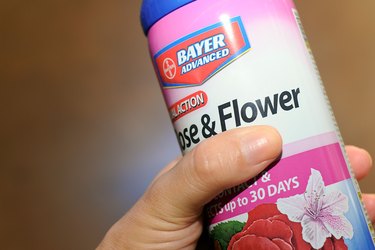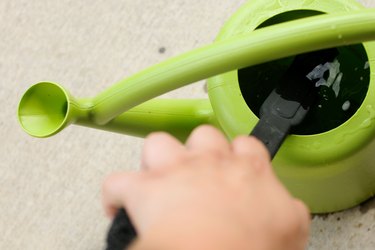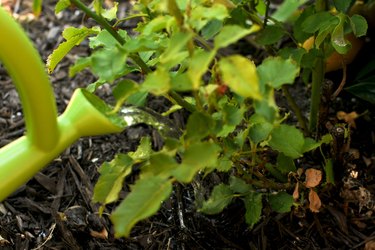Things You'll Need
Watering can
Tablespoon measure
Quart or gallon measure

There's a product that combines fertilizer, insecticide and disease control for flowers, including roses. BioAdvanced (formerly Bayer) All-in-One Rose and Flower Care is good for not only roses (Rosa spp.), but other blooming plants. These include: roses, hardy in U.S. Department of Agriculture plant hardiness zones 2 through 11, azaleas (Rhododendron spp.), hardy in USDA zones 4 through 10, and similar shrubs and flowers. The product's fungicide – tebuconazole – controls black spot, rust and other fungal diseases, while its insecticide – imidacloprid – kills aphids, Japanese beetles and other insects. The 6-9-6 fertilizer, high in phosphorus, encourages blooms and strong roots. Avoid applying this product near water; it it poisonous to aquatic invertebrates.
Step 1: Measure for Each Rose
Measure 1 capful of BioAdvanced All-in-One Rose and Flower Care for each rose you want to treat, when the plants begin to grow in the spring. Measure using the cap of the product, and put the amount you measured into a watering can. If you're treating a flower garden, measure 1/2 capful for every 12 square feet. If you're treating a shrub other than a rose, measure 1/2 capful for each foot of the shrub's height.
Video of the Day
Step 2: Add Water to the Mix
Add 1 quart of water to the watering can for each rose or for each foot of a shrub's height. If you're treating a flower garden, add 2 gallons of water for every 12 square feet.
Step 3: Mix Water and Granules

Shake or stir the watering can to mix the product with the water. Mix it well so the product will be evenly distributed over your plants.
Step 4: Water at the Base
Water the base of the rose or shrub. Avoid getting the product on the leaves. If you're watering a flower bed afterward, you can sprinkle the flowers if necessary, since the extra dilution from watering makes the product safer for the leaves.
Step 5: Water Plants Again
Fill the watering can with plain water and water the plants again to make sure you've applied all the product. Rinse out the watering can well when you're through so that left over product doesn't get on other plants.
Step 6: Repeat the Treatment

Repeat the treatment again in six weeks and 12 weeks for a total of three treatments a year. If you have sandy soil and problems with plant diseases, apply the product every six weeks, for a total of four applications a year.
Tip
Pull back any mulch and water the plants slowly so the product sinks down into the soil around the plants, rather than running off on the surface.
Warning
Before using the product, read the label warnings. Apply it only to ornamentals grown in the ground, not plants used for food or ornamentals in pots or window boxes.
Keep children and pets away from the stored product and out of the garden until the newly applied product dries.
Avoid contact with eyes or clothing, and wear long-sleeved shirt, long pants, shoes, socks, and gloves made of waterproof material. Wash your hands using soap and water after using the product.
Avoid activities that might get the product in your eyes or mouth, such as eating or smoking while using it, and don't reuse measuring utensils for food.
Video of the Day